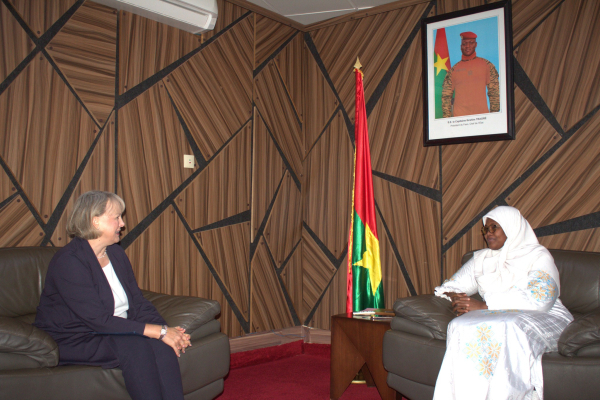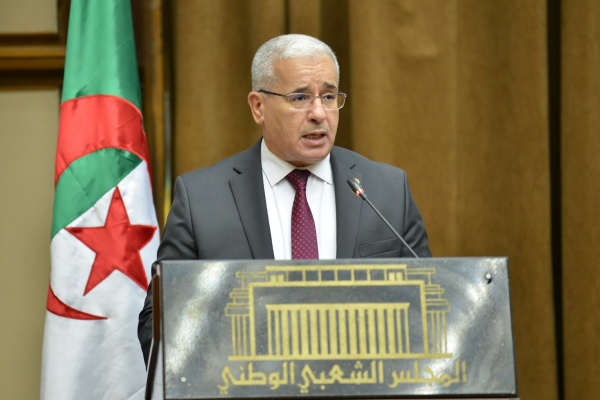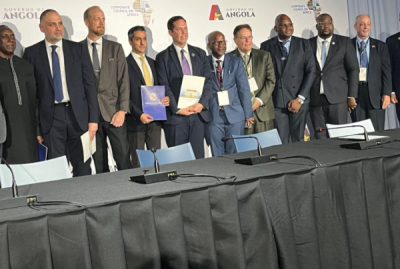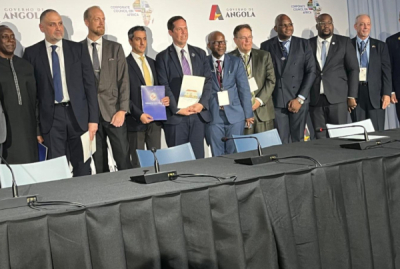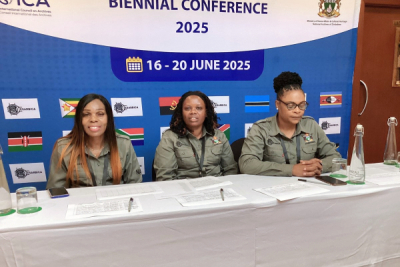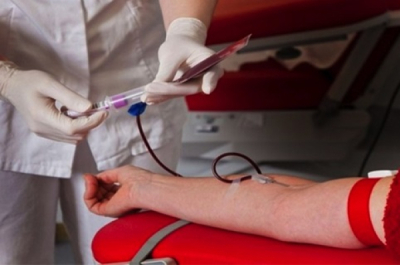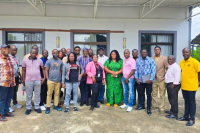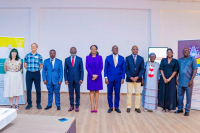
Public Management (599)
• Burkina Faso and the U.S. discussed digital cooperation, focusing on cybersecurity and infrastructure
• 2025 plans include data centers, network expansion, digital IDs, and a $150M transformation project
• Talks are early-stage; U.S. firms like Starlink and AWS may benefit as Burkina Faso seeks to close its digital gap
The Burkinabe government is exploring stronger digital cooperation with the United States. This was a key topic last week during a meeting between Aminata Zerbo/Sabane (photo, right), Minister of Digital Transition, and Joann Lockard (photo, left), the U.S. Ambassador to Burkina Faso.
"The government of Burkina Faso is undertaking many initiatives to support digital transition," Ambassador Lockard stated. "The American experience can be of great help in making this transition a success, particularly in the fields of cybersecurity and data control to protect citizens." She expressed confidence in the potential of American companies in the digital sector to support Burkinabe authorities' projects.
Among the major projects announced for 2025 are the completion of data centers, already 70 percent finished, and extending network coverage to at least 500 additional underserved localities. The ministry also plans to digitize more administrative services, carry out a large-scale population enrollment for electronic unique identification, and launch the Digital Transformation Acceleration Project, estimated at $150 million.
While no specific companies have been named yet in connection with this outreach, these projects could offer tangible opportunities for several U.S. firms already active in Africa. For instance, American Tower, a telecom infrastructure provider, and Starlink, for satellite internet access, might be considered for expanding network coverage. Other companies specializing in digital transformation, such as Microsoft, Oracle, Amazon Web Services (AWS), Cybastion, or Cisco, could also fit into this dynamic.
Furthermore, the United States is among the most advanced countries in digital governance. The United Nations ranks it 19th globally in the E-Government Development Index (EGDI), with a score of 0.9195 out of 1. In cybersecurity, the International Telecommunication Union (ITU) considers the U.S. a benchmark in its 2024 Global Cybersecurity Index. The U.S. scores 97.4 out of 100 on the ICT Development Index for 2025.
In contrast, Burkina Faso ranks 175th in the EGDI with a score of 0.2895, well below the global average of 0.6382. For cybersecurity, the country falls into the third of five categories, indicating that further efforts are needed, particularly to strengthen technical capacity and develop human capital.
Discussions between the two parties remain at a preliminary stage. No agreement has been signed or officially announced yet. The progression of these talks will need to be monitored to assess concrete partnership prospects and the actual involvement of American companies in Burkina Faso’s digital transformation.
Isaac K. Kassouwi
-
Algeria urged to update cybercrime and AI laws, says parliament speaker.
-
National strategy, school, and global partnerships underway.
-
Gaps remain in tech capacity and training despite strong legal base.
Algeria must modernize its regulatory framework to keep pace with technological developments and strengthen the fight against cybercrime. This message came from Brahim Boughali, Speaker of the National People's Assembly (APN), on Monday, June 30. He spoke during a parliamentary session focused on legal accountability in cybercrime and artificial intelligence.
According to Boughali, the rapid evolution of cyberspace demands a serious overhaul of legislative mechanisms to effectively confront emerging digital threats. He emphasized the importance of balancing citizens' rights and freedoms with the need for a robust approach to cybercrime prevention. He also highlighted the urgent need for a flexible legal framework that can anticipate future challenges related to artificial intelligence while remaining aligned with constitutional principles and international standards on data protection and digital sovereignty.
This legislative push complements the executive branch's efforts to bolster national cybersecurity. Algeria is looking to deepen cooperation with South Korea, which the International Telecommunication Union (ITU) considers a model in cybersecurity. It has also strengthened ties with Russia to advance in this field. A national cybersecurity strategy is currently being developed. In 2024, the country established a dedicated cybersecurity school, and the topic has been integrated into youth ICT (Information and Communication Technology) training programs, particularly through the nationwide "Skills Centers."
Despite these efforts, the ITU notes that Algeria already has a solid legal foundation, awarding it a score of 19.18 out of 20 in the legal framework category of the Global Cybersecurity Index. However, the country still faces challenges in expanding technical capabilities, building institutional capacity, training talent, and forging essential partnerships for effective cybersecurity. Algeria received an overall score of 65.87 out of 100, placing it in the third tier out of five on the global scale.
Written in French by Isaac K. Kassouwi,
Translated and adapted into English by Mouka Mezonlin
-
Cybastion to invest $25 million in Angola’s first phase of cybersecurity program
-
Full $170 million plan includes national cybersecurity agency and workforce training
-
Angola still ranks low on global cybersecurity index, with major gaps to address
The Angolan government has partnered with US technology company Cybastion to strengthen the country’s cybersecurity capabilities, with the firm committing to an initial $25 million investment.
The deal marks the first phase of a broader $170 million investment program announced last week in collaboration with state-owned operator Angola Telecom. The plan includes establishing a national cybersecurity agency and training new experts in partnership with the Cisco Networking Academy.
This effort aligns with Angola’s national digital transformation strategy, which aims to position information and communication technologies (ICT) as a driver of social and economic development. The International Telecommunication Union (ITU) considers cybersecurity a key factor for ensuring sustainable digital growth.
In 2024, Angola was ranked in Tier 4 of the ITU Global Cybersecurity Index, the second-lowest level on a five-tier scale. The ranking reflects limited engagement, with some progress in regulations and international cooperation, but significant work remains to strengthen technical capabilities, improve incident response mechanisms, and expand training and awareness efforts.
Angola has partnered with American technology company Cybastion to improve its cybersecurity. The government signed a deal with Cybastion, which pledged to invest $25 million to strengthen Angola’s digital defenses.
This agreement follows a memorandum of understanding the two parties signed in March during the Mobile World Congress 2025 in Barcelona. The partnership is part of Cybastion’s “Digital Fast Track initiative.”
Officials said this first investment marks the initial phase of a broader $170 million program launched with Angola Telecom. The full program includes creating a national cybersecurity agency and training a new generation of cybersecurity professionals. Angola will collaborate with the Cisco Networking Academy to deliver these training programs.
These moves support Angola’s national digital transformation strategy. The government wants to use information and communication technologies (ICT) to drive socio-economic development. The International Telecommunication Union (ITU) considers cybersecurity essential for any successful digital transformation.
In 2024, the ITU ranked Angola in “Tier 4” on its global cybersecurity index, the second-lowest level on a five-point scale. This score shows Angola has made some progress with regulations and international cooperation. However, the country still needs to strengthen technical tools for detection and incident response, improve organizational processes, and boost training and awareness for all stakeholders.
This article was initially published in French by Isaac K. Kassouwi
Edited in English by Ange Jason Quenum
-
Zimbabwe to launch $3M e-records system by year-end.
-
Pilot covers three ministries, targets 2030 development goals.
-
Challenges include skills, infrastructure, and data security.
Zimbabwe is set to launch an Electronic Document and Records Management System (EDRMS) valued at an estimated $3 million by the end of the year. Brenda Mamvura, Director General of the National Archives of Zimbabwe (NAZ), made the announcement Tuesday, June 17, during an interview with Herald Online. The interview took place on the sidelines of the 28th East and Southern Africa Regional Branch of the International Council on Archives (ESARBICA) conference, held in Victoria Falls from June 16 to 20.
Mamvura revealed that a company has already won the contract, and 60% of the procurement process is complete. The Ministries of Finance, Public Service, and the Office of the President and Cabinet have been selected to pilot the system before its nationwide rollout.
This initiative is part of the government’s broader ambition to elevate Zimbabwe to upper-middle-income status by 2030, with digital transformation serving as a key driver. Authorities aim to integrate information and communication technology (ICT) across society and economic sectors to accelerate sustainable socio-economic development. In public administration, the objective is to enhance service delivery, ensure more efficient and responsive governance, improve public resource management, and foster greater citizen engagement.
"The benefits of an EDRMS are clear," Mamvura said. "First, the integration of systems allows for smooth coordination across departments. Then, there’s improved efficiency. Public institutions and state-owned enterprises will be able to serve clients more quickly and effectively."
However, the system remains in its pilot phase, with implementation limited to three ministries for now. The digitization effort also raises several questions, particularly regarding the digital skills of public sector employees, the robustness of Zimbabwe’s technology infrastructure, the availability of adequate computer equipment, reliable internet access, and the protection of sensitive data.
By Isaac K. Kassouwi,
Editing by Sèna D. B. de Sodji
Algerian authorities are mobilizing for blood donation campaigns. They have decided to turn to technology to implement an innovative system in order to better manage these activities.
Algeria's Ministry of Health has launched a new digital platform to facilitate blood donations nationwide. Accessible via the Ministry's official website, the tool aims to enhance coordination between donors and blood transfusion centers while centralizing data on national blood needs.
Specifically, the platform allows citizens to register as donors, receive real-time updates on blood drives, and locate the nearest donation centers. In turn, center administrators can better plan collection campaigns and update their stock levels based on identified needs. This digital system is part of a broader strategy to modernize Algeria's blood collection network.
The initiative comes amid a steady increase in demand for blood products. It follows the second edition of the "Bank of Life" operation, which Algerian Radio launched in October 2024. Concurrently, the National Association of Algerian Pharmacists began a blood donation awareness campaign in June 2025, utilizing pharmacies as information hubs.
In the first half of 2024, over 354,000 units of blood were collected from 256 blood transfusion centers across the country. This represents a 5.49% increase compared to the same period in 2023. By combining a digital approach with citizen engagement, authorities hope to sustain collection efforts throughout the year, moving beyond the typical peaks of solidarity seen during specific times.
By Adoni Conrad Quenum,
Editing by Feriol Bewa
According to authorities, digital transformation is a key driver of Liberia’s socioeconomic development. It spans several areas of public governance, including tax administration.
The Liberia Revenue Authority (LRA) is intensifying its digital transformation strategy to modernize the nation's tax administration. Last week, the agency completed a thorough review of its Domestic Tax Department's standard operating procedures (SOPs) to align them with current operational realities, particularly in light of technological advancements. This review is a key component of a broader national initiative to digitize tax processes.
"We are moving toward automation. Our processes and SOPs must align accordingly. It is critical that we invest more in IT to reduce waste and eliminate redundant processes, including manual auditing. Countries like Zambia are already reaping the benefits of digitization, and we must follow suit,” said James Dorbor Jallah, Commissioner General of the LRA.
In May, the LRA introduced a new intelligent revenue monitoring system, developed by international tech firm N-Soft, designed to boost transparency and efficiency in tax collection. The same month, the LRA also expanded its partnership with the United Nations Development Programme (UNDP), focusing on three strategic areas: domestic resource mobilization, digital transformation, and institutional capacity building. Additionally, the Automated Performance Management System (APMS), introduced in September 2024, is slated for live operation in 2025.
Central to this transformation is the Liberia Integrated Tax System (LITAS), an integrated digital platform that streamlines tax management. LITAS offers a range of services, including online payments via bank transfer or Visa card, digital tools for tax calculation and verification, and the issuance of tax identification numbers and compliance certificates.
This digital push aligns with recommendations from the Organisation for Economic Co-operation and Development (OECD), which emphasizes that the primary goal of digital tax administration is to simplify and reduce the cost of tax compliance. The OECD highlights, "If paying taxes is burdensome, it results in higher time and financial costs for individuals and businesses. When scaled across the economy, these inefficiencies can represent significant losses in both direct costs and productivity."
Despite these advancements, Liberia's digital tax infrastructure remains under development. To ensure its effectiveness, several crucial prerequisites must be addressed: reliable internet access, appropriate digital equipment, a stable electricity supply, and comprehensive training for tax officials to develop the necessary digital skills for optimal system utilization.
By Isaac K. Kassouwi,
Editing by Sèna D. B. de Sodji
Digital transformation has disrupted every sector, including the labor market. By 2030, more than 230 million jobs in sub-Saharan Africa will require digital skills.
The Togolese government has unveiled a plan to train 15,000 students from public universities in computer programming and artificial intelligence (AI) this year. This initiative is part of a broader program launched earlier this month in partnership with U.S.-based startup Kira Learning, which aims to eventually train 50,000 students annually. The program's ultimate goal is to boost youth employability.
In addition to teaching Python programming and AI fundamentals, the curriculum includes practical training in English. The course is entirely free and accessible online, combining interactive lessons, instructional videos, and hands-on exercises. It is supported by an AI-powered virtual tutor capable of delivering personalized guidance to learners.
“This training opens the door to real job opportunities, even for students outside of scientific disciplines. In just three months, a humanities or literature student could qualify for roles such as IT support technician, digital project assistant, junior webmaster, content moderator, or data annotator for AI,” the Ministry of Digital Economy and Digital Transformation explained in a statement.
The initiative comes amid a continent-wide shift driven by digital transformation. The International Finance Corporation (IFC) estimates that by 2030, over 230 million jobs in sub-Saharan Africa will require digital competencies.
In Togo, public universities in Lomé and Kara enroll around 100,000 students. The country also has a notably young population: according to the World Bank, 60% of its 8 million citizens are under the age of 25. While the official unemployment rate stands at just 1.7%, widespread underemployment continues to undermine household financial stability. The World Bank notes that visible underemployment—jobs with fewer than 35 hours per week—affects 60% of the workforce.
Despite its promise, the program has limitations. By targeting only public university students, it excludes thousands from private institutions. Moreover, while the program is free, access can still be hindered by practical barriers such as internet costs and a lack of essential devices like computers, tablets, or smartphones.
Nonetheless, the initiative represents a significant step toward equipping Togo’s youth with the digital skills increasingly demanded by today's job market.
By Isaac K. Kassouwi,
Editing by Sèna D. B. de Sodji
Ghana’s digital economy is growing rapidly, with increasing reliance on fintech, e-commerce, and digital transactions. Strong legal frameworks are essential to protect businesses and consumers from cyber threats and ensure compliance with international data protection standards.
Ghana’s Ministry of Communication, Digital Technology and Innovations (MoCDTI) has announced plans to introduce 15 new digital laws aimed at strengthening cybersecurity, data protection, and digital economy regulation. The announcement was made on June 8 during a two-day workshop with Parliament’s Select Committee on Information and Communications, where the Ministry reaffirmed its commitment to transparency and collaboration in shaping the country’s digital future.
The proposed laws will focus on several critical areas, including cybersecurity regulations, data protection, and digital economy governance. As cyber threats continue to evolve, Ghana needs a robust legal framework to safeguard businesses and individuals from digital risks. The cybersecurity laws will enhance protections against cyberattacks, ensuring compliance with global security standards and reinforcing national resilience against digital threats. Additionally, the data protection laws will strengthen privacy rights, regulating how personal and corporate data is collected, stored, and used. With the increasing reliance on digital transactions, these measures will provide citizens with greater control over their information while ensuring businesses adhere to ethical data practices.
Another key aspect of the legislative agenda is the governance of Ghana’s digital economy. As fintech, e-commerce, and digital transactions become more prevalent, clear policies are needed to regulate these sectors effectively. The new laws will establish guidelines for digital financial services, ensuring consumer protection and fostering innovation.
Institutional reforms are also a major focus of the proposed legislation. One of the most significant changes discussed at the workshop is the transformation of the National Information Technology Agency (NITA) into a purely regulatory body. Currently, NITA operates both as a regulator and a service provider, which can create conflicts in governance. Under the new framework, its service-provider functions and government IT assets will be transferred to a separate entity, ensuring a clearer distinction between regulation and service delivery. This transition is expected to improve efficiency, streamline operations, and enhance oversight of Ghana’s digital infrastructure.
With Ghana’s digital economy expanding rapidly, these laws are essential for protecting citizens and businesses from cyber risks, encouraging investment in technology, and ensuring compliance with international data protection standards. The Ministry’s proactive approach signals a strong commitment to fostering innovation while maintaining security and accountability in the digital space.
The proposed laws will be rolled out in phases for parliamentary review, allowing for thorough discussions and stakeholder engagement. As Ghana positions itself as a regional digital leader, these legislative reforms will play a crucial role in shaping the country’s tech-driven future, ensuring that policies and infrastructure developments support sustainable growth and innovation.
Ghana has been actively developing laws to regulate and strengthen its digital economy. These laws aim to enhance consumer protection, regulate digital transactions, and ensure compliance with international standards. The country has existing digital laws such as the Electronic Transactions Act (2008), which grants legal recognition for electronic records, and the Payment Systems and Services Act (2019), which regulates digital financial services. The Cybersecurity Act (2020) established the Cybersecurity Authority, ensuring national security against cyber threats.
Hikmatu Bilali
In fifteen years, technological advances have reshaped the telecom and digital markets in Africa, creating both opportunities and challenges. However, the inadequacy of regulations hinders harmonious growth, limiting the sector’s full potential and its economic impact.
In 2024, ten African countries reached the highest level of regulatory maturity in the field of information and communication technologies (ICT) and digital governance. Among them, Burkina Faso and Senegal joined the G3 category, alongside several countries from Europe, America, and Asia. This level corresponds to a regulatory ecosystem conducive to investment, innovation, and universal access. On its platform https://app.gen5.digital/, consulted on June 3, 2024, the International Telecommunication Union (ITU) reveals that they are now just a few points away from the G4 level, the highest, which characterizes integrated regulation aligned with economic and social development goals.
Top 10 African countries with the best ICT regulatory ecosystem
|
No. |
Country |
Points 2024 |
Level 2024 |
Points 2023 |
Level 2023 |
|
1 |
Kenya |
93 |
G4 |
71.91 |
G3 |
|
2 |
Nigeria |
92 |
G4 |
64.81 |
G2 |
|
3 |
South Africa |
88 |
G4 |
69.29 |
G2 |
|
4 |
Malawi |
87.50 |
G4 |
59.57 |
G2 |
|
5 |
Egypt |
87 |
G4 |
69.29 |
G2 |
|
6 |
Rwanda |
85.67 |
G4 |
63.58 |
G2 |
|
7 |
Morocco |
85.50 |
G4 |
58.49 |
G2 |
|
8 |
Uganda |
85 |
G4 |
55.56 |
G2 |
|
9 |
Burkina Faso |
84 |
G3 |
48.77 |
G2 |
|
10 |
Senegal |
82.67 |
G3 |
50 |
G2 |
Source: ITU
In its G5 framework, the ITU ranks 193 countries according to four levels of regulatory maturity, assessed through 70 indicators grouped into four pillars: national collaborative governance; policy design principles; digital development tools; political agenda for the digital economy. The index, scored out of 100 points, distinguishes four levels of regulatory maturity:
- G1 (limited): 0–40 points – Monopolistic markets, authoritarian approach
- G2 (intermediate): 40–70 points – Partial liberalization and privatization
- G3 (advanced): 70–85 points – Environment conducive to innovation and competition
- G4 (leader): 85–100 points – Harmonized regulation, driver of digital transformation
Progress, but not enough
Between 2023 and 2024, African countries made significant progress in their ICT regulation. The Covid-19 pandemic acted as a catalyst, revealing as early as 2020 the urgency of digital transformation but also the regulatory gaps to be filled, particularly in spectrum management reform and digital services taxation.
The results are visible today. Most African countries ranked G1 and G2 in 2023 have moved up to G3. Only three countries still show a very low level of regulatory maturity, a sign of positive momentum.
Although this evolution is commendable, it still falls short of the targets set by the ITU: achieving G4 level for the majority, to ensure a digital economy that serves the continent's socio-economic development. To achieve this, it is imperative to invest in institutional capacities, strengthen regional cooperation, and adopt inclusive policies so that digital benefits everyone.
By Muriel EDJO,
Editing by Sèna D. B. de Sodji
Ranking of African countries
|
No. |
Country |
Points 2024 |
Level 2024 |
Points 2023 |
Level 2023 |
|
11 |
Liberia |
82.33 |
G3 |
41.82 |
G2 |
|
12 |
Botswana |
82 |
G3 |
55.09 |
G2 |
|
13 |
Tanzania |
81.67 |
G3 |
55.25 |
G2 |
|
14 |
Ghana |
81 |
G3 |
64.20 |
G2 |
|
15 |
Mauritius |
80.50 |
G3 |
62.81 |
G2 |
|
16 |
Seychelles |
79.50 |
G3 |
20.37 |
G1 |
|
17 |
Eswatini |
79 |
G3 |
48.92 |
G2 |
|
18 |
Zambia |
78.33 |
G3 |
49.07 |
G2 |
|
19 |
Guinea |
76.33 |
G3 |
33.80 |
G1 |
|
20 |
Tunisia |
75.83 |
G3 |
39.35 |
G1 |
|
21 |
Angola |
75.67 |
G3 |
28.55 |
G1 |
|
22 |
Cameroon |
75.67 |
G3 |
38.27 |
G1 |
|
23 |
Sudan |
75.50 |
G3 |
59.10 |
G2 |
|
24 |
Comoros |
74.17 |
G3 |
30.56 |
G1 |
|
25 |
Cape Verde |
74 |
G3 |
50 |
G2 |
|
26 |
Côte d'Ivoire |
74 |
G3 |
50 |
G2 |
|
27 |
Gambia |
72.67 |
G3 |
41.36 |
G2 |
|
28 |
São Tomé and Príncipe |
72.67 |
G3 |
27.62 |
G1 |
|
29 |
Togo |
71.67 |
G3 |
43.83 |
G2 |
|
30 |
Lesotho |
70.50 |
G3 |
28.86 |
G1 |
|
31 |
Mozambique |
70.50 |
G3 |
22.22 |
G1 |
|
32 |
Zimbabwe |
70.33 |
G3 |
56.94 |
G2 |
|
33 |
Benin |
70 |
G3 |
67.59 |
G2 |
|
34 |
DR Congo |
70 |
G3 |
41.82 |
G2 |
|
35 |
Namibia |
68.67 |
G2 |
34.88 |
G1 |
|
36 |
Niger |
68 |
G2 |
40.59 |
G2 |
|
37 |
Mali |
67 |
G2 |
44.91 |
G2 |
|
38 |
Algeria |
66 |
G2 |
50.93 |
G2 |
|
39 |
Mauritania |
66 |
G2 |
44.29 |
G2 |
|
40 |
Gabon |
64 |
G2 |
29.78 |
G1 |
|
41 |
Sierra Leone |
61.17 |
G2 |
38.27 |
G1 |
|
42 |
Burundi |
60.67 |
G2 |
26.70 |
G1 |
|
43 |
Chad |
58.67 |
G2 |
41.36 |
G2 |
|
44 |
Central African Rep. |
53.50 |
G2 |
26.54 |
G1 |
|
45 |
South Sudan |
53.17 |
G2 |
||
|
46 |
Ethiopia |
52 |
G2 |
50.62 |
G2 |
|
47 |
Somalia |
50.50 |
G2 |
22.22 |
G1 |
|
48 |
Guinea-Bissau |
50.33 |
G2 |
26.85 |
G1 |
|
49 |
Equatorial Guinea |
50 |
G2 |
17.59 |
G1 |
|
50 |
Eritrea |
14 |
G1 |
8.33 |
G1 |
|
51 |
Libya |
12.67 |
G1 |
3.70 |
G1 |
|
52 |
Djibouti |
4.50 |
G1 |
23.15 |
G1 |
Source: ITU
Regulatory Maturity Categories (ITU G5 Framework):
- G1 (limited): 0–40 points
- G2 (intermediate): 40–70 points
- G3 (advanced): 70–85 points
- G4 (leader): 85–100 points
More...
• Algeria to link labor and training ministry platforms in digital push
• New system enables real-time data sharing to align jobs and skills
• Move supports “Digital Algeria 2030” and youth workforce integration
Algeria is intensifying its digital transformation efforts by integrating public information systems with the Ministries of Labor and Vocational Training. On Thursday, May 29, both ministries signed to interconnect their digital platforms to harmonize training and employment policies nationwide.
The agreement provides for the establishment of an integrated system designed to facilitate the instant and secure exchange of data between the two ministries' digital platforms. The objective is to develop advanced planning and forecasting tools, enhancing coordination between vocational training and employment to meet market demands and foster a modern, skills-based economy built on accurate data.
According to Labor Minister Fayçal Bentaleb (photo, center), the initiative aligns with President Abdelmadjid Tebboune’s directives, which advocate for an integrated approach to developing skills that match the labor market's needs. Bentaleb noted that over 516,000 unemployment allowance recipients have already been directed towards short-term training programs, with 263,000 having successfully obtained professional certification.
This partnership is also a crucial component of Algeria's national digital transformation strategy, "Digital Algeria 2030." This comprehensive strategy is built upon five key pillars: the development of core digital infrastructure, training and skills enhancement, and digital governance. The human capital dimension is central to this strategy, with a focus on training and integrating young people into digital and new technology professions.
Once operational, the interconnected system is expected to significantly improve the alignment between available training programs and the skills in demand on the labor market. Automated data exchange will enable more effective guidance for young people toward promising fields, while providing decision-makers with precise tools to anticipate the demand for skilled labor. Ultimately, this digital integration is projected to modernize public employment management, streamline professional integration, and accelerate Algeria's transition to a knowledge-based economy.
By Samira Njoya,
Editing by Sèna D. B. de Sodji
• Minister George may adopt the “Asanka” device for the One Million Coders Program
• Asanka works offline, needs little power, and offers school content
• A pilot is planned, but no deal is signed yet
Samuel Nartey George (photo), Ghana's Minister of Communication, Digital Technology and Innovation, is considering a collaboration with local tech company TECHAiDE. The minister believes that the "Asanka" device, a locally developed offline Learning Management System (LMS) unveiled on Thursday, May 29, could be instrumental in achieving the government's ambitious goal of training one million coders over four years.
"The partnership is expected to have a significant impact on education in Ghana as well as the One Million Coders Program, making it more accessible, effective, and cost-efficient," the Ministry of Communication, Digital Technology and Innovation stated in a press release published on its Facebook page. The potential collaboration also includes the construction of computer labs equipped with the device, which would grant students access to the system.
According to TECHAiDE's website, the "Asanka" device operates without requiring internet access, with users connecting to it via Wi-Fi. The portable unit consumes only 5 watts and can be powered by a USB charger, a power bank, or a solar panel. It offers a broad spectrum of content, including Ghanaian school curricula, Basic Education Certificate Examination (BECE) topics, educational websites, videos, e-books, UNESCO educational resources, and interactive games.
The adoption of this device could significantly simplify access to coding training for beneficiaries. For example, it would eliminate the need for users to purchase internet data plans, a particularly relevant advantage given recent consumer complaints about rising internet service costs in Ghana. The minister has even convened a meeting with telecom operators scheduled for May 30 to address this issue.
Currently, the collaboration remains in an exploratory phase. Although Minister George has expressed keen interest, no formal agreement has been signed or officially announced. TECHAiDE also plans to launch a pilot project to test and refine its solution, with a view toward broader adoption and integration into existing school programs. However, the use of the Asanka device necessitates a compatible terminal such as a computer, tablet, or smartphone. Access to such equipment, particularly in Ghana's rural areas, remains a potential barrier that could hinder the widespread rollout and utilization of the solution.
By Isaac K. Kassouwi,
Editing by Sèna D. B. de Sodji
Reducing the cost of mobile data in Ghana is a significant step toward promoting digital inclusion, economic participation, and national development. For many Ghanaians, affordable internet access is not just a convenience but a necessity for education, e-commerce, financial services, and civic engagement.
Minister for Communications, Digital Technology and Innovation, Samuel Nartey George, has assured Ghanaians that the cost of mobile data will drop by the end of 2025. He said the Ministry is working closely with telecommunications stakeholders to make data more affordable.
Speaking during the 2025 World Telecommunication and Information Society Day on May 19, held under the theme "Gender Equality in Digital Transformation," the Minister reaffirmed his commitment to delivering on this promise.
“To the young people and all citizens of this country, I promised that by the end of this year, we’ll see data prices drop — and I remain committed to it. We will deliver, but trust the process,” he said.
His remarks follow recent public criticism on social media, where concerns were raised that a committee he established in February has not yet led to a reduction in data tariffs. The Minister clarified that the committee’s mandate was not to cut prices directly but to develop a strategic plan.
He urged the public to be patient, pointing to ongoing efforts to correct market imbalances caused by what he described as “eight years of policy distortions” under the previous administration.
The assurance comes at a time when high data costs continue to be a major concern for consumers and digital entrepreneurs alike. High data costs remain a major barrier to inclusive digital development, particularly in remote areas where infrastructure is weaker and incomes are lower.
According to recent market surveillance by the Billing Verification Unit of the National Communications Authority (NCA) published April 2024, the average cost of 1GB of data per month in Ghana is GH₵6.30 (approximately $0.61). The study further revealed that the cheapest 1GB package costs as little as GH₵1.08 ($0.10), while the most expensive reaches GH₵16.77 ($1.62). This wide disparity in pricing highlights the inconsistencies in data affordability across different service providers and regions, reinforcing the need for regulatory oversight and market reforms.
Hikmatu Bilali
• Morocco places AI at center of digital strategy, minister tells Parliament
• Plans include a new AI directorate, a UNDP-backed digital hub, and 12 regional Jazari Institutes
• Youth training programs to target ages 8–18 in digital and AI skills
Morocco is putting artificial intelligence (AI) at the forefront of its digital transformation efforts. Speaking before Parliament earlier this week, Minister Delegate for Digital Transformation and Administrative Reform, Amal El Fellah Seghrouchni, said the aim is to leverage digital tools to accelerate social and economic development.
The government plans several key initiatives, including the creation of a dedicated AI directorate and the launch of a regional Arab-African digital hub in partnership with the United Nations Development Programme (UNDP). Additionally, a network of centers of excellence, dubbed the “Jazari Institute,” will be established across Morocco’s 12 regions.
Two national training programs targeting digital and AI skills for youth aged 8 to 18 are also in the works. To further unify efforts, a national AI conference is scheduled for July 1-2 in Rabat, aiming to foster a shared and responsible vision for AI development among stakeholders.
These measures are part of Morocco’s broader “Digital 2030” strategy, which seeks to harness AI’s potential to fast-track the digitalization of public and private services while nurturing a thriving digital economy. The government intends to back projects that consolidate data registers and frameworks, deploy AI use cases to improve citizen and business services, attract international AI experts, and support startups and companies in high-value-added sectors.
Moreover, the plan includes developing the skills and infrastructure necessary for responsible AI deployment, establishing evaluation mechanisms, and initiating multidisciplinary discussions on AI’s societal, legal, and economic impacts.
The United Nations recognizes AI’s potential to drive digital transformation. In its “E-Government Survey 2024,” the UN Department of Economic and Social Affairs (DESA) noted that AI technologies can enhance public sector operations by automating administrative tasks, increasing efficiency, and reducing backlogs and redundancies. The report also highlighted AI’s role in advancing sustainable development goals.
However, many of Morocco’s AI initiatives remain in the project phase, with their success hinging on effective implementation. DESA also cautions about AI-related risks, including algorithmic biases that may misrepresent certain groups, as well as ethical, security, and social challenges. The UN agency underscored that the ongoing digital divide poses a significant barrier to integrating AI technologies effectively in the public sector.
By Isaac K. Kassouwi,
Editing by Sèna D. B. de Sodji


